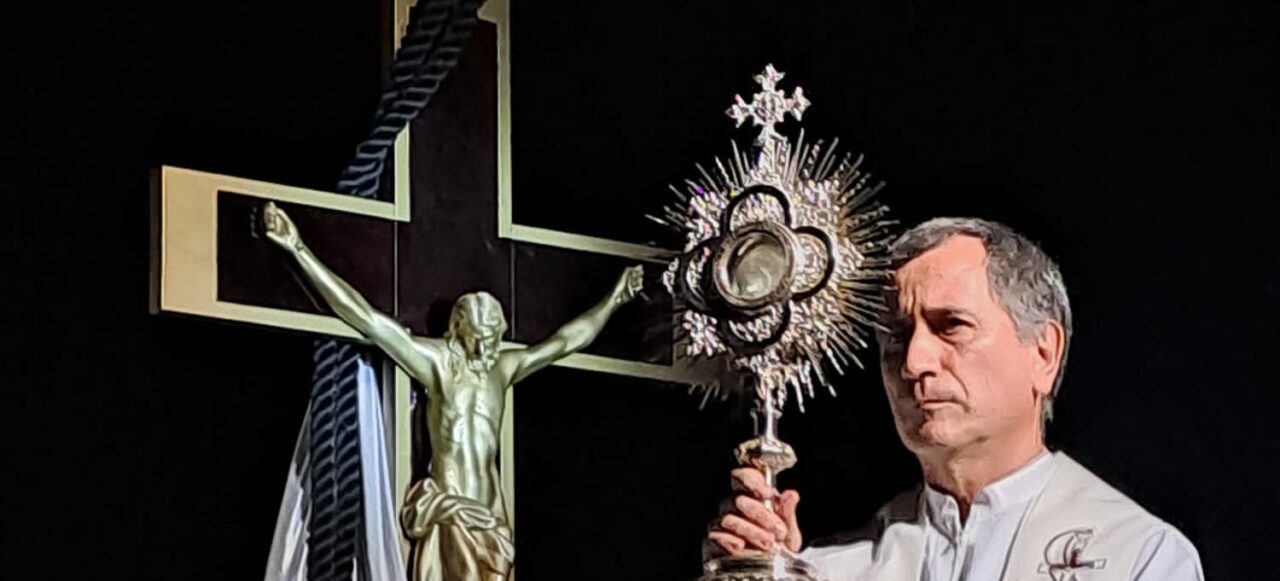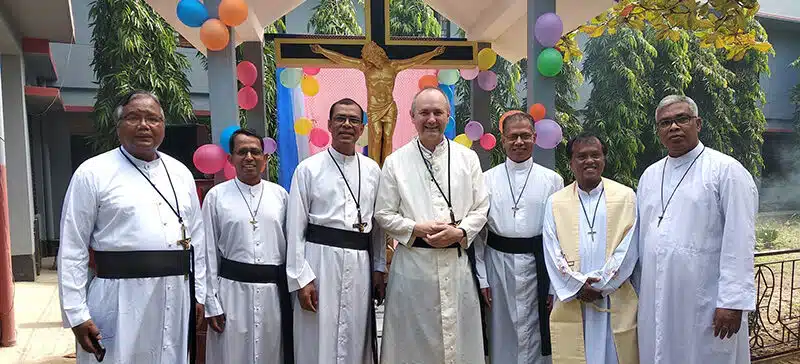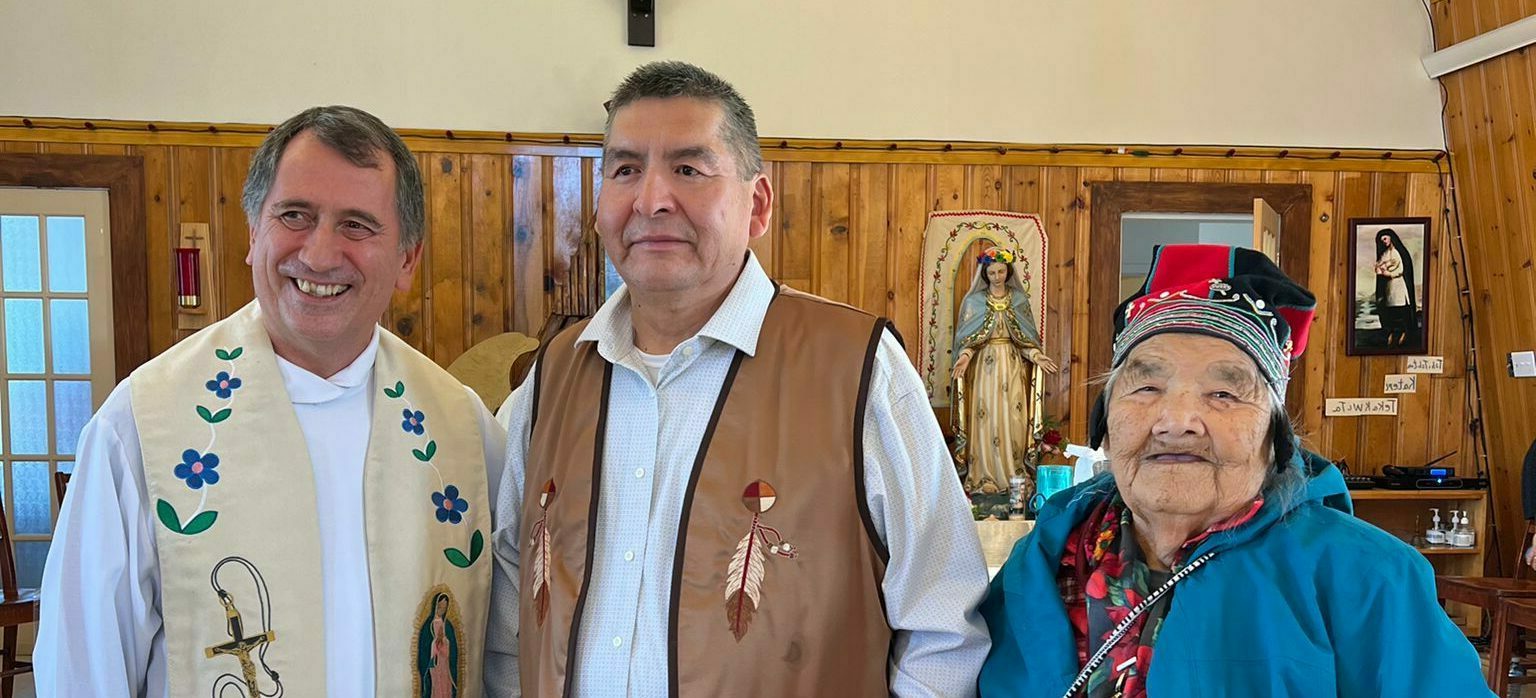Benoit DOSQUET, OMI
For some years now, the General Committee of Oblate Brothers is responsible for organising the animation for commemorating the anniversary of the First Vows of November 1st, 1818. This year they propose 24 hours of adoration at the School of the Saviour for the whole Mazenodian family from October 31 at noon to November 1 at noon.
The General Committee of Oblate Brothers would like to propose to you a community day of recollection which would include several stages. Principally a time of adoration: do not hesitate to sign up for the 24 hours of adoration at the School of the Savior, which is suggested to the Mazenodian family between October 31 at 12 noon and November 1, 12 noon (CET).
Meditation for the anniversary of the first vows of November 1, 1818
In recent years, the General Committee of Oblate Brothers has been responsible for animating the anniversary of the first vows in the congregation (November 1, 1818).
Starting from the Constitution 163: “The Constitutions and Rules set out a privileged means for each Oblate to follow in the footsteps of Jesus Christ. … Thus, they allow each Oblate to evaluate the quality of his response to his vocation and to become a saint.” This Constitution is recalled in the Acts of the 37th chapter (PHC 7.2)
To offer you this reflection, the committee was inspired by the Founder’s retreat notes at the end of October 1831 [cf. Spiritual Writings 1812-1856, n° 162 and 163].
In his first letter to Father Tempier, October 9, 1815, the Founder wrote: “… this holy society, which will have but one heart and one soul; part of the year will be spent for the conversion of souls; another part in retreat, study, our personal sanctification […] This is enough to give you a taste of the spiritual delights that we will taste together.”
The General Committee of Oblate Brothers would like to propose to you a community day of recollection which would include several stages. Principally a time of adoration: do not hesitate to sign up for the 24 hours of adoration at the School of the Savior, which is suggested to the Mazenodian family between October 31 at 12 noon and November 1, 12 noon (Roman time).
Concerning adoration, Saint Eugene wrote to Father Tempier on July 26, 1817: “Almost every evening, I am with you in front of the Blessed Sacrament during your evening prayer …”
The passage from the first letter of Saint Paul the Apostle to Timothy (1 Tim 4: 16), which we find in the preface to our CCRR, could serve as a guide: “Attend to yourself and to your teaching; persevere in both tasks, for by doing so you will save both yourself and those who listen to you.”
In his retreat notes of 1831, the Founder, began with this remark: “What a shame to have such a perfect rule in your hands, and not understand the meaning …” The 37th Chapter also mandated: “That Superiors and their Councils ensure the implementation of animation in their respective Units in tune with this Chapter recommendation.” (PHC V, B, 3).
“The end of our congregation is the same as that of the Son of God,” wrote the Founder. “The glory of his celestial Father and the salvation of souls. And we are established precisely to work for the conversion of souls, and especially to evangelize the poor.”
This triptych: the glory of God, love of the Church and salvation of men is the heart of our spirituality. We find it in the preface and multiple times in the writings of our Founder. In particular, in his letter of March 20, 1826, to Father Tempier, where he expressed his joy for the approval of the rules: “We will never be able to appreciate it, other than by fidelity in all adversity, by an increase of zeal and dedication to the glory of God, the service of the Church and the salvation of souls, especially the most abandoned, in accord with our vocation.”
The trilogy of our vocation as Missionary Oblates which we find at the beginning of our Constitutions: “The call of Jesus Christ, heard within the Church through people’s need for salvation, draws us together as Missionary Oblates of Mary Immaculate.” (C 1).
The Founder invites us to become other Christs through contemplation and action.
Let us take the time to reread the three texts which are found after the Preface and which influence our Constitutions:
Co-workers with the Saviour (1818)
What more sublime purpose than that of their Institute? Their founder is Jesus Christ, the very Son of God; their first fathers are the Apostles. They are called to be the Savior’s co-workers, the co-redeemers of mankind; and even though, because of their present small number and the more urgent needs of the people around them, they have to limit the scope of their zeal, for the time being, to the poor of our countryside and others; their ambition should, in its holy aspirations, embrace the vast expanse of the whole earth.
To preach Christ crucified (1826)
Like the Apostle, to preach “Jesus Christ, and him crucified… not in loftiness of speech, but in the showing of the Spirit,” that is to say, by making manifest that we have pondered in our hearts the words which we proclaim, and that we began to practice before setting out to teach.
With Jesus on the cross (1826)
Since the ministers of the Gospel will never reap abundant fruit from their labours, unless they hold in highest esteem, and, so to speak, constantly bear about in their own body the death sufferings of Jesus, the members of our Society will earnestly strive to keep their passions in check and to deny their self-will in everything; like the Apostle, they will glory in their weaknesses, in insults, persecutions and distress endured for the sake of Christ.
These texts remind us that the heart of the apostolic spirituality of Eugene de Mazenod is the very person of Christ the Savior, whose cooperators we will only truly be to the extent that we imitate him in everything. Not only by an external imitation but by a profound interior transformation which consists of “forming Christ” in us, the “sequela Christi” on which the decree Perfectæ Caritatis insists.
The second point of our triptych: “The Church, this beautiful heritage of the Savior…” (Preface)
The Founder heard the call of Jesus Christ through the situation of the Church. He wrote to his mother on October 11, 1809: “Do not begrudge this poor Church, so horribly neglected… and which nevertheless gave birth to us all in Jesus Christ, the homage that two or three individuals in all of France (of which small number I consider myself so happy to be) want to make her their freedom and their life. And why would you want me to delay any longer in committing myself, in devoting myself to the Bride of Jesus Christ.”
Father Jetté, in his commentary on the Preface, writes: “It is not for this or that particular group that our Founder founded the Oblates – even if the poor, the most abandoned have his preference – but it is for the Church, for love of the Church.” And Father Jetté ended by recalling the words of Pope Paul VI, during the beatification of the Founder: “He was passionate about Jesus Christ and unconditional about the Church.”
Our Founder wrote in his Episcopal Mandate of February 16, 1860: “How would it be possible to separate our love of Jesus Christ from that which we owe to the Church? These two loves merge; to love the Church is to love Jesus Christ and vice versa…”
“The Rule,” wrote our Founder, “we received it from the Church through the hand of Pope Leo XII and thus our life should only be obedience to the Church.” He recommends that we absorb our Rule of life: “It is only in this way that we will be what God wants us to be, and that we will make ourselves worthy of our sublime vocation.”
Touched by the situation of the Church, the Founder put himself into the school of Christ; he returned to the pillar of our vocation: “How, indeed, did our Lord Jesus Christ proceed when he undertook to convert the world? He chose a number of apostles and disciples whom he himself trained in piety, and he filled them with his Spirit. These men he sent forth, once they had been schooled in his teaching, to conquer the world which, before long, was to bow to his holy rule.” This brings us back to Constitution No. 3 and our community dimension as Missionary Oblates. Our first Fathers were certain that it was necessary to form apostolic men. The way of the apostolic man is to follow Christ after the manner of the Apostles, working seriously to become saints.
In Gaudete et exsultate, the Apostolic Exhortation on the call to holiness in today’s world, Pope Francis appeals to us: “Do not be afraid of holiness, it will not take away your strength, nor your life, nor joy”… “do not be afraid to aim higher, nor to let yourself be guided by the Holy Spirit.” In number 14 he states: “We are all called to be holy by living our lives with love and by bearing witness in everything we do, wherever we find ourselves. Are you a consecrated person? Be holy by living your commitment with joy…”
In his retreat notes of 1831, the Founder insisted: “The end of this little Society of Missionaries… is… that the Priests came together… and as brothers living as one, gave their main attention to the evangelization of the poor, following the CONSTANT IMITATION OF THE VIRTUES AND EXAMPLES OF OUR SAVIOR JESUS CHRIST. […] Let us engrave these words in our hearts, let us write them everywhere so that we always have them before our eyes.”
Our spirituality is indeed to contemplate Christ, to reproduce his virtues and thus fulfill our apostolic ministry: the salvation of all. The salvation of all, not only through our ministry, but above all through our way of living which is rooted in the manifestation of the Spirit. Our life must reflect the contemplation and meditation of the Word of God, abandoning everything in following Jesus Christ…” (Constitution No. 2) An action which is called to be constantly renewed.
The third point of this trilogy: “the salvation of souls, especially the most abandoned”.
The Founder emphasizes this in his writings of 1831: “The main goal of the Institute is to provide for the needs of the most abandoned souls. This is why those miserable in prison have a legitimate right to our charity.”
Recently, the appeal of the General Chapter repeated: “We must not forget that the cry of the earth is the cry of the poor to whom we must give preference”, in reference to Constitution No. 5 (PHC 11,2) . Father General titled his letter of February 17, 2023: “Taking care of our common home to be a missionary home for the poor.” And in his letter of August 15, he described his second point of conversion: “The Missionaries of the poor in dialogue and in moving outward”.
- Let us dare to take a moment as a community to review the place we give to the poor with their many faces, starting from Constitution No. 5, in order to be first of all wherever life places us at the wall of human dignity:
- Our principal service in the Church is to proclaim Christ and his Kingdom to the most abandoned.
- We preach the Gospel among people who have not yet received it and help them see their own values in its light.
- Where the Church is already established, our commitment is to those groups it touches least.
- Wherever we work, our mission is especially to those people whose condition cries out for salvation and for the hope which only Jesus Christ can fully bring.
- These are the poor with their many faces; we give them our preference.
Without forgetting that we have to recognize hope among the poorest, as Pope Francis tells us in his message in the 37th Chapter: “Letting yourselves be evangelized by the poor whom you evangelize, they teach you the path of hope, for the Church and for the world.”
“Community life is a missionary gift that we must make fruitful by collaborating with the Holy Spirit: such is our task,” wrote the Superior General in his letter of February 17, 2023. This discernment is not an individual task, but community discernment. “It is in and through the community to which we belong that we accomplish our mission. Our communities therefore have an apostolic character.” (Constitution No. 37) It is “the entire community which takes responsibility for the mission that the Church has entrusted to it,” says the document Identity and Mission of the religious Brother in the Church, at No. 23.
Let us remember what Pope Francis told us during the last General Chapter: “May your Founder, the charism he transmitted to you, and his missionary vision be and remain points of reference for your life and your work; to stay rooted in your missionary vocation, above all by living the testament of your Founder, in mutual love among yourselves and in zeal for the salvation of souls. It is the heart of your mission and the secret of your life, and this is why the Church still needs you. In the immense field of the mission that is the entire world, may Jesus always be your model, as he was for Saint Eugène. Before the crucified Saviour, he decided one day to offer his own life so that everyone, especially the poor, might be able to experience the same love of God that had restored him to the path of faith.”
Let us end by turning to her who, through her response of faith and her total availability to the call of the Spirit, is our model, our Mother and Mother of the Church, with this prayer from Pope Francis (Encyclical LUMEN FIDEI, from June 29, 2013):
Mother, help our faith!
Open our ears to hear God’s word and to recognize his voice and call.
Awaken in us a desire to follow in his footsteps, to go forth from our own land and to receive his promise.
Help us to be touched by his love, that we may touch him in faith.
Help us to entrust ourselves fully to him and to believe in his love, especially at times of trial, beneath the shadow of the cross, when our faith is called to mature.
Sow in our faith the joy of the Risen One.
Remind us that those who believe are never alone.
Teach us to see all things with the eyes of Jesus, that he may be light for our path.
And may this light of faith always increase in us, until the dawn of that undying day which is Christ himself, your Son, our Lord!
Benoit DOSQUET, OMI
Permanent Secretary of the Committee
Aix, September 21, 2023.


